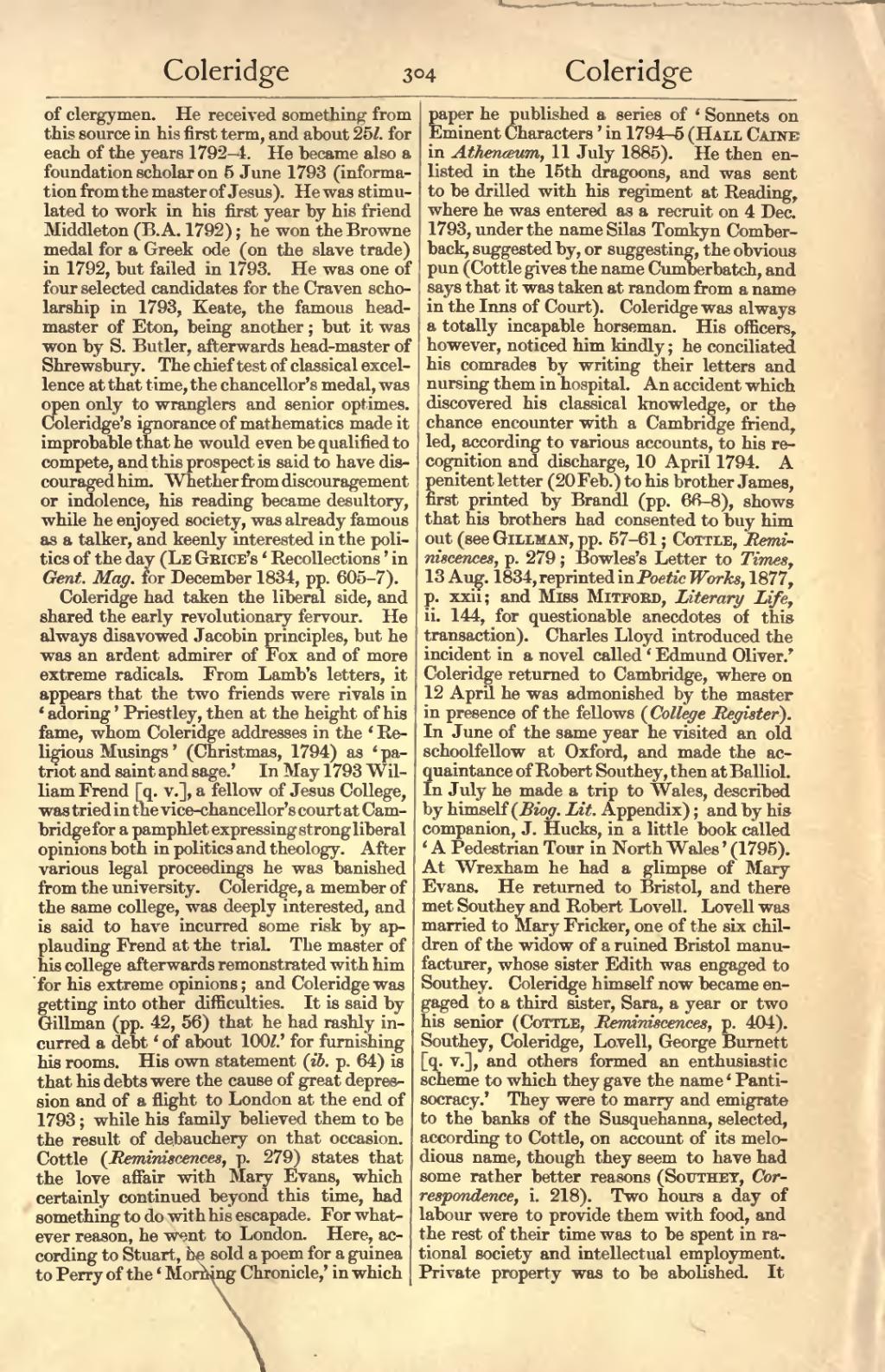of clergymen. He received something from this source in his first term, and about 25l. for each of the years 1792-4. He became also a foundation scholar on 5 June 1793 (information from the master of Jesus). He was stimulated to work in his first year by his friend Middleton (B.A. 1792); he won the Browne medal for a Greek ode (on the slave trade) in 1792, but failed in 1793. He was one of four selected candidates for the Craven scholarship in 1793, Keate, the famous headmaster of Eton, being another; but it was won by S. Butler, afterwards head-master of Shrewsbury. The chief test of classical excellence at that time, the chancellor's medal, was open only to wranglers and senior optimes. Coleridge's ignorance of mathematics made it improbable that he would even be qualified to compete, and this prospect is said to have discouraged him. Whether from discouragement or indolence, his reading became desultory, while he enjoyed society, was already famous as a talker, and keenly interested in the politics of the day (Le Grice's 'Recollections' in Gent. Mag. for December 1834, pp. 605-7).
Coleridge had taken the liberal side, and shared the early revolutionary fervour. He always disavowed Jacobin principles, but he was an ardent admirer of Fox and of more extreme radicals. From Lamb's letters, it appears that the two friends were rivals in 'adoring' Priestley, then at the height of his fame, whom Coleridge addresses in the 'Religious Musings' (Christmas, 1794) as 'patriot and saint and sage.' In May 1793 William Frend [q. v.], a fellow of Jesus College, was tried in the vice-chancellor's court at Cambridge for a pamphlet expressing strong liberal opinions both in politics and theology. After various legal proceedings he was banished from the university. Coleridge, a member of the same college, was deeply interested, and is said to have incurred some risk by applauding Frend at the trial. The master of his college afterwards demonstrated with him 'for his extreme opinions; and Coleridge was getting into other difficulties. It is said by Gillman (pp. 42, 56) that he had rashly incurred a debt 'of about 100l.' for furnishing his rooms. His own statement (ib. p. 64) is that his debts were the cause of great depression and of a flight to London at the end of 1793; while his family believed them to be the result of debauchery on that occasion.
Cottle (Reminiscences, p. 279) states that the love affair with Mary Evans, which certainly continued beyond this time, had something to do with his escapade. For whatever reason, he went to London. Here, according to Stuart, he sold a poem for a guinea to Perry of the 'Morning Chronicle,' in which paper he published a series of 'Sonnets on Eminent Characters' in 1794-5 (Hall Caine in Athenæum, 11 July 1885). He then enlisted in the 15th dragoons, and was sent to be drilled with his regiment at Reading, where he was entered as a recruit on 4 Dec. 1793, under the name Silas Tomkyn Comberback, suggested by, or suggesting, the obvious pun (Cottle gives the name Cumberbatch, and says that it was taken at random from a name in the Inns of Court). Coleridge was always a totally incapable horseman. His officers, however, noticed him kindly; he conciliated his comrades by writing their letters and nursing them in hospital. An accident which discovered his classical knowledge, or the chance encounter with a Cambridge friend, led, according to various accounts, to his recognition and discharge, 10 April 1794. A penitent letter (20 Feb.) to his brother James, first printed by Brandl (pp. 66-8), shows that his brothers had consented to buy him out (see Gillmart, pp. 57-61; Cottle, Reminiscences, p. 279; Bowles's Letter to Times, 13 Aug. 1834, reprinted in Poetic Works, 1877, p. xxii; and Miss Mitford, Literary Life, ii. 144, for questionable anecdotes of this transaction). Charles Lloyd introduced the incident in a novel called 'Edmund Oliver,' Coleridge returned to Cambridge, where on 12 April he was admonished by the master in presence of the fellows (College Register). In June of the same year he visited an old schoolfellow at Oxford, and made the acquaintance of Robert Southey, then at Balliol. In July he made a trip to Wales, described by himself (Biog. Lit. Appendix); and by his companion, J. Hucks, in a little book called 'A Pedestrian Tour in North Wales' (1795). At Wrexham he had a glimpse of Mary Evans. He returned to Bristol, and there met Southey and Robert Lovell. Lovell was married to Mary Fricker, one of the six children of the widow of a ruined Bristol manufacturer, whose sister Edith was engaged to Southey. Coleridge himself now became engaged to a third sister, Sara, a year or two his senior (Cottle, Reminiscences, p. 404). Southey, Coleridge, Lovell, George Burnett [q. v.], and others formed an enthusiastic scheme to which they gave the name ' Pantisocracy.' They were to marry and emigrate to the banks of the Susquehanna, selected, according to Cottle, on account of its melodious name, though they seem to have had some rather better reasons (Southey, Correspondence, i. 218). Two hours a day of labour were to provide them with food, and the rest of their time was to be spent in rational society and intellectual employment. Private property was to be abolished. It
